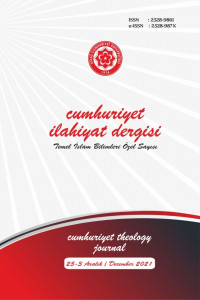Mukâtil Tefsirinde Mekkî Sûrelerde Bedir Gazvesine Yapılan Atıflar
The References to the Battle of Badr in the Makkī Surahs in Tafsīr Al-Muqātil
Author(s): Nurdane GülerSubject(s): Semiotics / Semiology, Islam studies, Semantics, History of Islam, Qur’anic studies
Published by: Cumhuriyet Üniversitesi İlahyat Fakültesi
Keywords: Tafsīr; Muqātil; Badr; Makkī; Madanī;
Summary/Abstract: The Tafsīr al-Muqātil (d. 150/767) is the oldest available complete commentary text. In this respect, it has been a focus of attention. In this tafsīr, the references to the Battle of Badr in the explanation of some Makkī surahs are remarkably numerous. Badr was the first war that the Prophet made with the polytheists of Makkah, and it took place in the second year of the migration to Madīna (A. H. 2). The polytheists were far superior to the Muslims in terms of both equipment and numbers. Therefore, the success achieved in this expedition meant a lot not only in terms of survival but also in terms of morale of Muslims. Details of this war are included in Surah Anfāl, and various aspects of it are referred to in other Madanī surahs. It is not difficult to understand the mention of such an important war in Madanī surahs. However, the references to the Battle of Badr -which has not yet taken place- in the commentary of the Makkī surahs, are particularly challenging. In this tafsīr, 66 verses of various Makkī surahs are explained through the Battle of Badr. This study was carried out in order to reveal the background of the Badr references of the Makkī surahs in Muqātil tafsīr. Muqātil stands out in the Hadith in terms of reliability, and in the Kalām as a widely discussed personality with his various views. Although he has been criticized from various aspects of his Tafsīr, it is generally considered a great authority. His work is easy to understand; it combines narration and insight. The similar of every possible verse has been given. The author's mastering at the Arabic language showed itself in the words of the Qur’ān. Almost no words remained unexplained. Muqātil is closely related to the Arabic language that had been in effect in the era of revelation, and he generally carried out his tafsīr activities by considering the era of revelation. In Muqātil's view of tafsīr, no verse is independent from the experiences of the period, and each verse gains meaning with its context. In his tafsīr, Muqātil draws a view of Badr without alternatives. While other tafsīrs include other achievements of Muslims in addition to Badr, such as the victory of the Battle of the Ditch and the conquest of Makkah, in the tafsīr of Muqātil the difference of Badr as the biggest blow against the polytheists of Makkah is clearly stated. It may not be very convincing to explain his insistence on Badr as random touches and sometimes anachronistic mistakes, given his skill in tafsīr and his command of the Qur’ān in terms of both content and language. Badr stands as a conscious choice, not a mistake in Muqātil. As it can be seen in examining the verses, the forward-looking statements present in the majority of the verses; this emphasis also prepared the ground for Muqātil's explanations. In any case, Muqātil sometimes did not care about falling into historical inconsistency. If we exclude these 5 verses, which can be explained with Badr although they are Makkī, the attitudes of other commentators regarding the emphasis of Badr in the Makkī verses in the remaining 61 verses are as follows: al-Ṭabarī (d.310/923) included the views pointing to Badr in only 3 of the 61 verses in his tafsīr. This shows us that the emphasis of Badr in the Makkī verses was not generally adopted by other early commentators except Muqātil. Because in al-Ṭabarī's tafsīr, the views on tafsīr from the era of Aṣ-ṣaḥābah (the Companions), Tābiʿūn (the second generation following the Companions) and Tābiʿū al-Tābʿīn (the third generation) are mentioned together with isnad (the chain of reporters), except for Muqātil and al-Kalbī. al-Zad̲j̲d̲j̲ād̲j̲(d. 311/923), who was contemporary of Ṭabarī, included Badr in only two of the 61 verses in his philological tafsīr. In other words, al-Zad̲j̲d̲j̲ād̲j̲is on a very different line from Muqātil regarding Badr. al-Māturīdī (d. 330/944) included Badr among other explanations in only 4 of the 61 verses in his tafsīr, and did not mention Muqātil's view even among the possible meanings of the other verses. al-Rāzī (d. 606/1210) included Badr in 10 of 61 verses among other explanations. In the remaining 51 verses, he did not find it necessary to mention Muqātil's view along with other possibilities. Apparently, al-Rāzī, like others, did not consider Muqātil's explanations reasonable. Nevertheless, Razi was the commentator who gave greater place to the Badr emphasis of Muqātil in his tafsīr. In this case, how can the passion for Badr, seen in the Muqātil tafsīr, be explained? We think it would be correct to seek the reasons of Muqātil's -sometimes reasonable, sometimes inappropriate, and sometimes anachronistic- explanations of Badr in the importance he gave to this expedition and in the method of relying on concrete data in the interpretation of the Qur’ānic verses. In his view of tafsīr, no verse is independent of the experiences of the period. He takes care to include information reflecting the historical situation in almost every verse. Apparently, within the scope of this path he followed in his tafsīr, Muqātil felt the need to remind Badr, which the polytheists of Makkah regarded as the greatest torment they had ever seen in their worldly life, by mentioning it in verses containing torment, threat, and revenge.
Journal: Cumhuriyet İlahiyat Dergisi
- Issue Year: 25/2021
- Issue No: 3
- Page Range: 1143-1162
- Page Count: 20
- Language: Turkish

